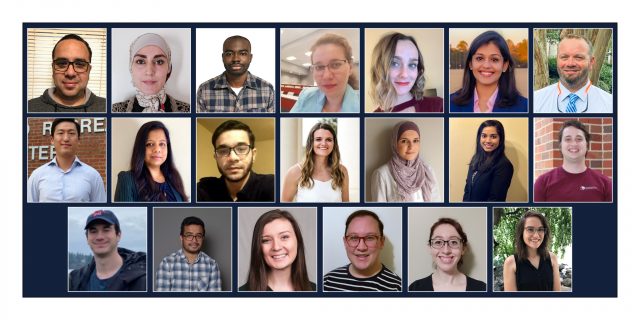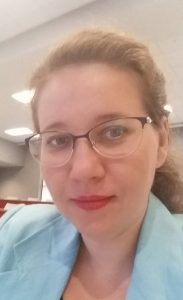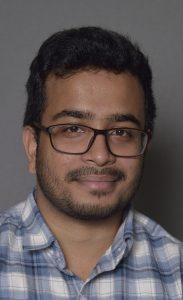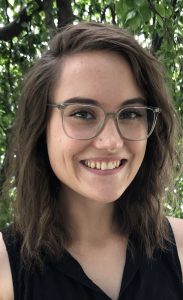
Twenty UM graduate students are exploring a range of research and creative scholarship as recipients of Graduate Student Council Research Grants.They are (top, from left) Mohammed Ahmed, Omayma Al Azzam, Tomayo Berida, Olena Ciftci, Savannah Draud, Kritika Gupta and James Howington; (middle) Myungjin Jung, Siddhi Korgaonkar, Salahuddin Mohammed, Hannah Nelson, Alaa Qrareya, Monika Salkar and Benjamin Sawyer; and (bottom) Joshua Semko, Samir Senapati, Caitlin Shaw, Jaret Webb, Kendall Wontor and Natasha Wood.
OXFORD, Miss. – With projects ranging from service robots in the hospitality and tourism industries to a novel treatment of dry eye disease to relationship ghosting, 20 University of Mississippi graduate students are exploring a range of research and creative scholarship as recent recipients of Graduate Student Council Research Grants.
The $1,000 grants, funded by the university’s Graduate School and Office of Research and Sponsored Programs, or ORSP, will support projects that contribute to the university’s research mission while also helping the students develop their research and grant-writing skills.
“We had an outstanding set of grant applications this year,” said Annette Kluck, dean of the Graduate School and professor of leadership and counselor education. “When you look at the research our graduate students pursue, it is hard not to get excited about their impact on the world.
“These are outstanding students whose expertise and scholarship contribute to our research mission. We are honored that we have these awards to help make this work possible and to support our students.”
Established at the suggestion of the Graduate Student Council more than 10 years ago, the goals of the program are to promote the research and creative scholarship of Ole Miss graduate students and increase their marketability, competitiveness and opportunities. The program also expands the ability of graduate students to conduct research and creative scholarship projects to a degree not possible with departmental funds alone.
“This program is excellent for sparking and challenging our graduate students’ imagination and creativity, not only regarding ideas for research and scholarly work but also for how to get funding for that work,” said Robert Doerksen, associate dean of the Graduate School and professor of medicinal chemistry in the Department of BioMolecular Sciences. “Thanks to ORSP and the Graduate Student Council’s leadership and Senate for their continued enthusiasm for and support of this funding opportunity.”
The program requires students to identify a suitable external funding opportunity to which they could apply for additional funding or resources, such as a travel grant program, internship opportunity or fellowship. Their proposals also received feedback from ORSP on how the submissions complied with standard guidelines used by well-known funding agencies such as the National Science Foundation.
Olena Ciftci, a doctoral student in the Department of Nutrition and Hospitality Management, is researching information systems in the hospitality and tourism industries as she works toward her dissertation, where she plans to develop a scale to measure customer experience with service robots in hospitality and tourism settings.

Doctoral student Olena Ciftci plans to use her research grant from the Graduate Student Council to study how service robots used in the hospitality and tourism industries are perceived by customers. Submitted photo
Her research grant project advances her investigation of how service robots used in the hospitality and tourism industries are perceived by customers.
“With the development of technology, robots have been applied in various sectors of the hospitality and tourism industry (e.g., airlines, hotels, restaurants); they are used as service agents to perform customer services,” Ciftci wrote in her project summary. “Thus, hospitality and tourism managers should have a tool to measure customer experiences with service robots to be able to enhance the overall service experience and increase satisfaction and loyalty.
“Furthermore, the service robot developers also need to have instruments to measure customer experience with service robots in hospitality settings to develop industry-specific robots.”
Ciftci plans to apply for an external grant to attend the Global Conference on Business and Economics in September in Sarasota, Florida.
“This grant will benefit my academic career because I will have the opportunity to present my research at the international academic conference and, hopefully, receive feedback from experienced researchers in my field,” she wrote. “Furthermore, participation in the international conference increases my visibility on the job market and facilitates networking.”
Samir Senapati just finished his second year in the Department of Pharmaceutics and Drug Delivery in the School of Pharmacy, where he is pursuing a doctorate in pharmaceutical sciences.
For his project, Senapati is studying a new treatment for dry eye disease, from which an estimated 16 million to 20 million Americans suffer.

Samir Senapati, a doctoral student in pharmaceutics, will use his research grant to study using an advanced mode of drug delivery system known as a nanoemulsion to treat dry eye disease. Submitted photo
“Dry eye disease is a disease which is characterized by unstable tear film caused either by excessive tear evaporation (evaporative dry eye disease) or by tear film deficiency (aqueous dry eye disease),” Senapati wrote in his project summary.
His grant will fund research into using an advanced mode of drug delivery system known as a nanoemulsion, which uses specially manufactured nano-sized emulsions to improve the delivery of active pharmaceutical ingredients, according to a 3 Biotech journal article published in 2014.
Senapati’s project continues his doctoral research using nanotechnology that mostly involves the delivery of drugs that treat the eye and its diseases. His results will provide preliminary data for writing grants to external funding sources such as the American Association of Pharmaceutical Scientists or the National Institutes of Health.
“Ghosting” is the term used for ending a relationship where one partner cuts off all contact with a romantic partner without notice.
Natasha Wood, who just finished her first year as a doctoral student in the university’s experimental psychology program, is investigating this unique form of rejection that has emerged in the modern dating world. Her project will explore the role of a novel construct – need for closure – on how willing someone is to ghost others.
“Like other forms of rejection, ghosting is a painful experience,” Wood wrote in her project summary. “Past research has qualitatively explored the experience of ghosting past partners and being ghosted, but very little research to date has investigated the motivations behind why someone chooses ghosting as a breakup strategy.

Natasha Wood, a doctoral student in psychology, is using her research grant to examine a modern form of rejection in relationships known as ghosting. Submitted photo
“Due to the lack of communication and direct rejection leading to prolonged vagueness about the relationship status, ghosting is an ambiguous breakup strategy and creates uncertainty for the initiator and target.”
While her research will contribute to the existing close relationships literature and ostracism literature, her project also will explore a modern dating strategy that is popular among emerging adults due to the proliferation of online dating apps.
Wood plans to apply for an American Psychological Foundation grant to further examine the role of ostracism and social isolation on violent extremism.
“The project will expand our knowledge on the impact of basic psychological need deficits on radicalization to violent extremism,” wrote Wood, a Montana native who aims to pursue a career in federal law enforcement or intelligence as a social science researcher.
“Results of the project will be presented to other social scientists and people in the terrorism field at national conferences and will be submitted to high-impact journals. In turn, these findings will have exciting countering violent extremism policy implications.”
In 2020, the Graduate Student Council Research Grants supported 16 projects, researching topics from skin cancer to young adult literature in Mississippi classrooms.
The complete list of 2021 awardees, their graduate program and application titles are:
- Mohammed Ahmed, Ph.D. in pharmaceutical sciences, “Probing the Antibacterial Activity of Bacterial Siderophores”
- Omayma Al Azzam, Ph.D. in engineering science, “Investigation of Nanoscale Cell Dynamics that Generate Forces for Muscle Contraction”
- Tomayo Berida, Ph.D. in pharmaceutical sciences, “Development of Non-Nucleoside MraY Inhibitors for Tuberculosis Chemotherapy”
- Olena Ciftci, Ph.D. in nutrition and hospitality management, “Customer Experience with Service Robots in Hospitality and Tourism”
- Savannah Draud, Ph.D. in biological science, “Can the Symbiosis between Caribbean Octocorals and Their Algal and Bacterial Symbionts Contribute to Coral Reef Structure Variability and Diversity?”
- Kritika Gupta, Ph.D. in nutrition and hospitality management, “Resilience Capacity of the School Meal Programs in Mississippi during the COVID-19 Pandemic”
- James Howington, Ed.D. in education, “Seeking Alternative Behaviors: Action Research to Address Bullying”
- Myungjin Jung, Ph.D. in health and kinesiology, “Effects and Mechanisms of Cognitive Impairment During High-Intensity Acute Exercise: Experimental Evaluation of the Transient Hypofrontality Theory”
- Siddhi Korgaonkar, Ph.D. in pharmaceutical sciences, “Examination of the Role of Coping in Financial Toxicity among Cancer Survivors in the U.S.”
- Salahuddin Mohammed, Ph.D. in pharmaceutical sciences, “Sex Differences in Steroidogenic Response to Hypothalamic Pituitary Adrenal Stress Axis Dysregulation in HIV-1 Tat Female Mice”
- Hannah Nelson, Ph.D. in health and kinesiology, “The Use of Heart Rate Monitoring for Determination of Adherence to High Intensity, Low Volume Exercise in Sedentary Female College Students”
- Alaa Qrareya, Ph.D. in pharmaceutical sciences, “HIV-1 Tat Accelerates Age-Related Co-Morbidities in Aged Female Mice that are Moderated by Aging Endocrine”
- Monika Salkar, Ph.D. in pharmaceutical sciences, “Coping Patterns among Adult Sickle Cell Disease Patients and Health-Related Quality of Life Implications of a Latent Class Analysis”
- Benjamin Sawyer, Ph.D. in pharmaceutical sciences, “Synthesis and Assessment of Potential Carbazole-Based Antimalarials”
- Joshua Semko, Ph.D. in psychology, “Effects of Mortality Salience on Cooperative Behavior in an Iterated Prisoner’s Dilemma”
- Samir Senapati, Ph.D. in pharmaceutical sciences, “Effect of Retinol Palmitate as Stabilizer on Cyclosporine A Loaded Nanoemulsion for Treatment of Dry Eye Disease: A Synergistic Effect”
- Caitlin Shaw, Ph.D. in psychology, “Daily Sexism and the Consequences on Women and Men’s Well-Being”
- Jaret Webb, M.S. in communication sciences and disorders, “Speech-Language Pathology Telepractice Strategies for Rapport Building within the ASD Community”
- Kendall Wontor, Ph.D. in chemistry, “Sonication as a Novel Extraction Method for Microplastic Analysis in Oysters”
- Natasha Wood, Ph.D. in psychology, “The Link between Need for Closure and Ghosting Intentions: Individual Differences in Emerging Adults’ Romantic Relationship Dissolution Strategies”